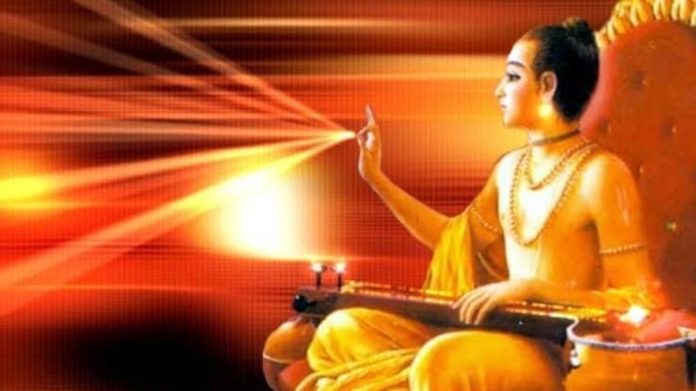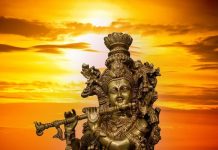Srimad Bhagawatham, Mahatmyam, Chapter Two Sloka 13: Kalina…Hey beautiful one, there is no comparison to Kali among the other yugas. In this yuga, I shall see to it that you are present in every household and among all people.
Interpretation: Sage Narada continues his dialogue with Bhakti. Despite the terrible conditions due to Kali Yuga, the sage recognises the good aspects of the times we live in. This is the divine nature of learned Munis like Narada Muni. They know how to look at the positive side. The Muni also conveys the message that every coin has two sides. If we focus only on the dark side, we are bound to be depressed. But every cloud has a silver lining.
The Muni tells Bhakti that she will be present in every household during Kali Yuga and will be the focal point of all bhaktas.
Srimad Bhagawatham, Mahatmyam, Chapter Two Sloka 14: Anyadharma…I shall tell you how I shall establish you. Despite the downfall of established norms, you will be found in the temples of Sri Hari where the Lord is worshiped in various forms, including fine arts. If I am not able to do so, I shall not be known as Haridasa (devotee of Sri Hari).
Interpretation: Narada Muni takes a pledge that he will establish Bhakti. And the starting point are temples of Sri Hari (Krishna in various forms). The word temples should be read along with the words ‘every household’ that the Muni referred to earlier. So, the starting point is that every household should have a ‘temple’ or a place of worship. Some go to temples for bhakti, others find bhakti in the ‘temples’ in their homes and some find bhakti in the temples that they establish in their hearts. It does not matter where, the importance is that one should establish a space for bhakti for the soul’s spiritual journey. For such people, Kali Yuga will not affect them.
Srimad Bhagawatham, Mahatmyam, Chapter Two Sloka 15: Thvadanvi…In Kali yuga, if people commit sins but have bhakti in them, they would without doubt attain Vaikuntam (and of the Lord).
Interpretation: This does not mean that since you are a bhakt, you can commit sins. The meaning here is that if you unknowingly commit a sin, but you are a devotee of Sri Hari, you will still attain Vaikuntam or the supreme state of realisation of Godhood.
Srimad Bhagawatham, Mahatmyam, Chapter Two Sloka 16: Yesham…Those who fill their hearts with pure love to the lord and have pure and unalloyed bhakti, these pure souls would not see Yama (Lord of Death) even in their dream.
Srimad Bhagawatham, Mahatmyam, Chapter Two Sloka 17: Na predouv…Evil forces would never be able to touch or come near people who have pure bhakti.
Srimad Bhagawatham, Mahatmyam, Chapter Two Sloka 18: Nathapobi…The Gopis are proof that one need not practice tough penance or take difficult paths to attain the Lord. Pure bhakti is enough for attaining the Lord in Kaliyuga.
Interpretation: The Gopis of Brindavan are examples of pure and unalloyed bhakti. This state is also tough to attain, but through constant practice, one can reach that state. The lives of the Gopis revolved around Sri Krishna, day and night. They lived and breathed for Sri Krishna. That is the supreme form of bhakti.
Srimad Bhagawatham, Mahatmyam, Chapter Two Sloka 19: Nrinam…Only through the good deeds done in numerous births would one get the belief and find joy in pure bhakti. In Kaliyuga, bhakti is the best path to reach Sri Krishna.
Srimad Bhagawatham, Mahatmyam, Chapter Two Sloka 20: Bhaktidrohakara…Whoever harms bhaktas, they would suffer in all the three worlds. Durvasa, who did not respect bhakti, had to pay a price (This story will come up in Srimad Bhagavatham).
Srimad Bhagawatham, Mahatmyam, Chapter Two Sloka 21: Alamvrite…In Kaliyuga, there is no need to do penance or take a dip in holy rivers or do yaga (fire sacrifice) or hear discourse with an intention to gain knowledge. Only bhakti is needed for mukti or liberation of the soul.
Interpretation: Narada Muni is clear. Do not run around in search of bhakti. Bhakti is within you; bhakti is a state of the mind.




















































